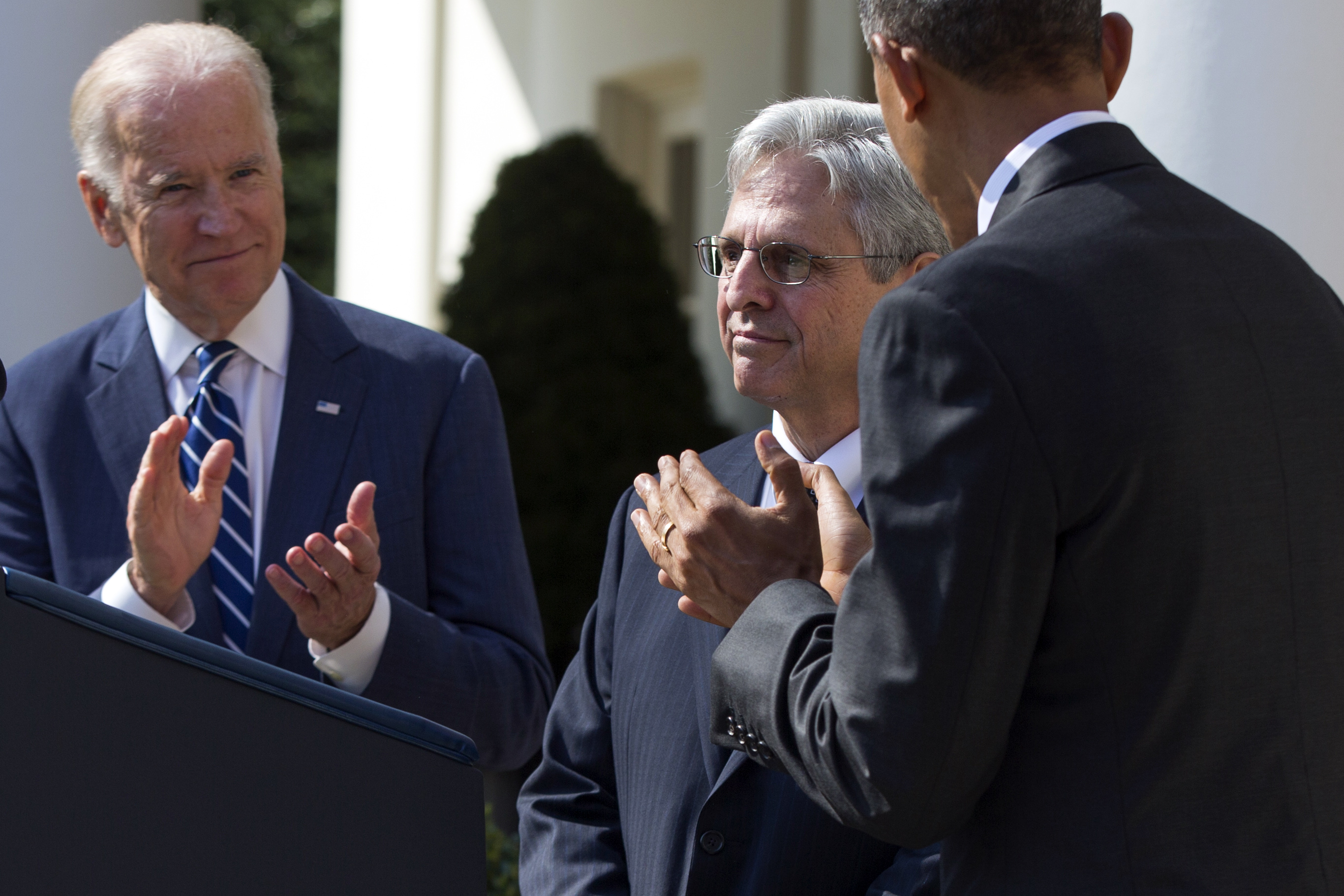Why I'm glad the Senate is taking a stand against progressive Supreme Court nominees
Merrick Garland, and any other person Obama or Clinton might like to see nominated, plays far too fast and loose with the Constitution


I'd like to take this opportunity to remind you of something: America has a federal government. And this government is made up of three branches, each of which is held responsible for checking and balancing the others.
I only bring this up in case you might have forgotten. I know I sometimes do, especially during this crazy election season when all eyes are on just one of those three branches: the executive branch. Sometimes I have to be reminded that America actually has parts of government other than the traveling freakshow that is Donald Trump vs. Hillary Clinton, and that there is a place called Washington, D.C., where (some) people try to do the serious business of governing.
Let's focus, for now, on the Supreme Court. Currently there are eight members sitting on that court, even though there should be nine. This is because Antonin Scalia, conservative lion, passed away earlier this year, and there is a Democratic president and a Republican majority in the Senate. A Democratic nominee taking Scalia's spot would probably strongly alter the balance of the court for a generation. Republicans are understandably wary of letting this happen.
The Week
Escape your echo chamber. Get the facts behind the news, plus analysis from multiple perspectives.

Sign up for The Week's Free Newsletters
From our morning news briefing to a weekly Good News Newsletter, get the best of The Week delivered directly to your inbox.
From our morning news briefing to a weekly Good News Newsletter, get the best of The Week delivered directly to your inbox.
The Republican majority in the Senate has said it will not hear or confirm a nominee this year, until a new president is elected. At the time GOP senators staked out this position, it seemed reasonable to bet that the next president might be a Republican. Republican primary voters had a different idea.
Now that it seems all but guaranteed that the next president will be a Democrat, some Republicans are taking their conviction further, saying they will not accept a nomination at all, even when Hillary Clinton is president. Earlier this week, John McCain became the first in the Senate to give voice to that line of thinking.
Many on the left are saying that this — not accepting any nomination for the Supreme Court — is beyond the pale. But I'm actually quite happy to see the Senate take such a stand against progressive nominees.
Why? Because the method of Constitutional interpretation progressives want to see in their justices is not just wrong, but illogical. Republican senators are right to reject any Obama or Clinton nominee out of hand, because these nominees hold an incorrect view of the Constitution. If, when begrudging the Senate's unwillingness to accept a nominee, progressives are going to throw around arguments about legitimacy and political norms, they are sawing the branch on which they are sitting.
A free daily email with the biggest news stories of the day – and the best features from TheWeek.com
Conservatives believe legal texts should be interpreted according to their meaning at the time the text was adopted as law. On the flip side, the progressive method of interpretation is more like deciding what you want the text to mean and then shoehorning that meaning into the text. They believe a judge's job is to decide what the law should say and then figure out a way to make the law say that.
Judges are political appointees. Everyone has biases. No interpretive method is perfect. But there is still a momentous — and worrying — difference between these two approaches.
For example, it is an article of faith in the progressive legal profession that the Constitution protects a right to legal abortion. The fact that for 150 years nobody ever thought that to be the case troubles them not.
If conservatives were equivalent on this front, you would have dozens of conservative jurists, scholars, and jurists lining up to explain that, say, the Equal Protection Clause of the Constitution protects the right to life of every embryo and fetus. Instead, they pointedly don't do that, because abortion is not among the things the Constitution says the federal government can deal with, and so the issue is left up to the states. A court of nine Scalias would not enact a federal ban on abortion. And no conservative is calling for appointing justices that will do such a thing, even though it would accomplish with a stroke of a pen everything for which pro-lifers have been fighting for decades. To do so would be a travesty, and a joke.
A judge might believe that the law is wrong and his own beliefs are right. But is that really how we want them to judge?
Any just society, any society worthy of the name, must be a society of laws, a society where certain rules of the political game are beyond debate and agreed upon. We have to all work and ensure that our fundamental laws are not messed with. Laws can send people to prison, take people's properties, take people's children. Legitimizing the idea that one can interpret laws to mean whatever one wants them to mean, as long as one wants it badly enough, essentially makes a mockery of this bedrock pillar of civilization. It is exactly the sort of thing Orwell had in mind when he described 1984's Newspeak.
In a just world, these theories of "interpretation" would make any just person recoil, and indeed they would make principled progressives recoil first and foremost.
Pascal-Emmanuel Gobry is a writer and fellow at the Ethics and Public Policy Center. His writing has appeared at Forbes, The Atlantic, First Things, Commentary Magazine, The Daily Beast, The Federalist, Quartz, and other places. He lives in Paris with his beloved wife and daughter.
-
 What would a UK deployment to Ukraine look like?
What would a UK deployment to Ukraine look like?Today's Big Question Security agreement commits British and French forces in event of ceasefire
-
 Nicolás Maduro: from bus driver to Venezuela’s president
Nicolás Maduro: from bus driver to Venezuela’s presidentIn the Spotlight Shock capture by US special forces comes after Maduro’s 12-year rule proved that ‘underestimating him was a mistake’
-
 Artemis II: back to the Moon
Artemis II: back to the MoonThe Explainer Four astronauts will soon be blasting off into deep space – the first to do so in half a century
-
 Bari Weiss’ ‘60 Minutes’ scandal is about more than one report
Bari Weiss’ ‘60 Minutes’ scandal is about more than one reportIN THE SPOTLIGHT By blocking an approved segment on a controversial prison holding US deportees in El Salvador, the editor-in-chief of CBS News has become the main story
-
 Has Zohran Mamdani shown the Democrats how to win again?
Has Zohran Mamdani shown the Democrats how to win again?Today’s Big Question New York City mayoral election touted as victory for left-wing populists but moderate centrist wins elsewhere present more complex path for Democratic Party
-
 Millions turn out for anti-Trump ‘No Kings’ rallies
Millions turn out for anti-Trump ‘No Kings’ ralliesSpeed Read An estimated 7 million people participated, 2 million more than at the first ‘No Kings’ protest in June
-
 Ghislaine Maxwell: angling for a Trump pardon
Ghislaine Maxwell: angling for a Trump pardonTalking Point Convicted sex trafficker's testimony could shed new light on president's links to Jeffrey Epstein
-
 The last words and final moments of 40 presidents
The last words and final moments of 40 presidentsThe Explainer Some are eloquent quotes worthy of the holders of the highest office in the nation, and others... aren't
-
 The JFK files: the truth at last?
The JFK files: the truth at last?In The Spotlight More than 64,000 previously classified documents relating the 1963 assassination of John F. Kennedy have been released by the Trump administration
-
 'Seriously, not literally': how should the world take Donald Trump?
'Seriously, not literally': how should the world take Donald Trump?Today's big question White House rhetoric and reality look likely to become increasingly blurred
-
 Will Trump's 'madman' strategy pay off?
Will Trump's 'madman' strategy pay off?Today's Big Question Incoming US president likes to seem unpredictable but, this time round, world leaders could be wise to his playbook
